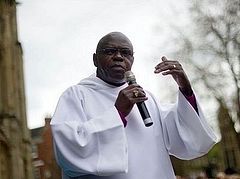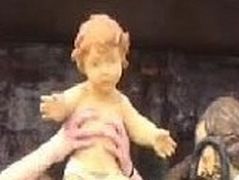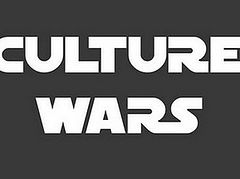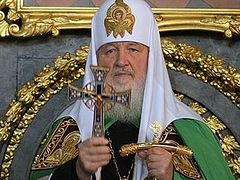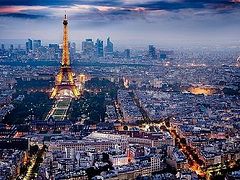St. Justin Popovic (April 6, 1894-April 7, 1979) survived two world wars in Serbia, and in this treatise on European culture he discerns the problems with the European worldview that led to such a human disaster, and touches upon the probable future.
Theanthropic culture transfigures man from within, and thereby likewise influences his external condition. It transfigures the soul, and by way of the soul, it transfigures the body. According to this culture, the body is the temple of the soul, and it lives, moves and has its being through the soul. Take away the soul from the body and what will remain other than a stinking corpse? The God-man first of all transfigures the soul, and subsequently also the body. The transfigured soul transfigures the body; it transfigures matter.
The goal of Theanthropic culture is to transfigure not only man and humanity, but also all of nature through them. But how is this goal to be attained? Only by Theanthropic means: through the evangelic virtues of faith and love, hope and prayer, fasting and humility, meekness and compassion, love of God and neighbor. It is by means of these virtues that Theanthropic Orthodox culture is fashioned. Pursuing these virtues, man transfigures his deformed soul, making it beautiful; it is transformed from something dark into something light, something sinful into something holy, something with a dark countenance into something Godlike. And he transfigures his body into a temple that can accommodate his Godlike soul.
It is through the ascetical labor of acquiring the evangelic virtues that man acquires power and authority over himself and over nature around him. Banishing sin both from himself and from the world that surrounds him, man likewise banishes its savage, destructive, ruinous force; he fully transfigures himself and the world, and subdues nature, both within and without and around himself. The finest examples of this are the saints: having sanctified, having transfigured, themselves through the ascetical labor of attaining the evangelic virtues, they likewise sanctify and transform nature around them. There are many saints who were served by wild beasts and who, simply by the mere fact of their appearance, could subdue and tame lions, bears and wolves. They treated nature prayerfully, mildly, meekly, compassionately, and gently, being neither harsh, nor stern, nor hostile, nor ferocious.
It is not an external, violent, mechanical imposition thereof, but an inner, good-willed, personal assimilation of the Lord Jesus Christ through the ascetical labor of the Christian virtues that establishes the Kingdom of God on earth; establishes Orthodox culture—for the Kingdom of God does not come externally or visibly, but internally, spiritually, imperceptibly. The Savior says: The kingdom of God cometh not with observation: Neither shall they say, Lo here! or, lo there! for, behold, the kingdom of God is within you (Lk 17:20-21). It is within the God-created and Godlike soul, sanctified by the Holy Spirit, For the kingdom of God is not meat and drink; but righteousness, and peace, and joy in the Holy Spirit (Rom. 14:17). Yes, in the Holy Spirit, and not in the spirit of man. It can be in the spirit of man to the extent that man fills himself with the Holy Spirit by means of the evangelic virtues. Wherefore the very first and very greatest commandment of Orthodox culture is: Seek ye first the kingdom of God, and his righteousness; and all these things shall be added unto you (Mt. 6:33), that is, everything will be added unto you that is needed for supporting the life of the body: food, clothing, and shelter (Mt. 6:25-32). All these things are but the appurtenances of the Kingdom of God, yet Western culture seeks these appurtenances first of all. This is where its paganism to be found, for, in the words of the Savior, it is the pagans who seek these appurtenances first of all. In this lies the tragedy of Western culture, for it has starved the soul in its concern for material things, whereas the sinless Lord has stated once and for all: Therefore I say unto you, Take no thought for your life, what ye shall eat, or what ye shall drink; nor yet for your body, what ye shall put on (For after all these things do the Gentiles seek:) for your heavenly Father knoweth that ye have need of all these things. But seek ye first the kingdom of God, and his righteousness; and all these things shall be added unto you (Mt. 6:25, 32-33; Lk. 12:22-31).
Great is the extent of those necessities that modern man passionately creates in his imagination. In order to satisfy these senseless needs men have turned our wondrous Divine planet into a slaughterhouse. But our philanthropic Lord has long since revealed “the one thing needful” for each man and for all of humanity. And what is this? The God-man, Jesus Christ, and everything that He brings with Him: divine truth, divine justice, divine love, divine goodness, divine holiness, divine immortality and eternity, and all the other divine perfections. That is “the one thing needful” for man and for humanity, and all the rest of man’s necessities, in comparison with this are so insignificant that they are almost unneeded. (Luke 10:42)
When man seriously, and in accordance with the Gospel, contemplates the mystery of his own life and of the life around him, then he must of necessity conclude that the most pressing need is to reject all necessities and follow decisively after the Lord Jesus Christ, to unite with Him by way of perfecting evangelic ascetical labors. Without having done this, man remains spiritually unfruitful, senseless, lifeless; his soul dries up, crumbles away, disintegrates, and he gradually grows insensate, until he finally dies completely; for Christ as divine did say: Abide in me, and I in you. As the branch cannot bear fruit of itself, except it abide in the vine; no more can ye, except ye abide in me. I am the vine, ye are the branches: He that abideth in me, and I in him, the same bringeth forth much fruit: for without me ye can do nothing. If a man abide not in me, he is cast forth as a branch, and is withered; and men gather them, and cast them into the fire, and they are burned (Jn. 15:4-6).
It is only through a spiritually organic unity with the God-man Christ that man can continue his life into life eternal, and his being into one of eternal existence. A man of Theanthropic culture is never alone: when he thinks, he thinks through Christ, when he acts, he acts through Christ, when he feels, he feels through Christ. In a word: he constantly lives through Christ-God, for what is man without God? At first he will be half a man, and in the end, no man at all. It is only in the God-man that man finds the completeness and perfection of his own being, his Prototype, his perpetuity, his immortality and eternity, his absolute worth. The Lord Jesus Christ, alone among men and all beings, proclaimed the human soul to be the greatest treasure of all worlds, of those both above and below. Fear them not therefore: for there is nothing covered, that shall not be revealed; and hid, that shall not be known. (Mt. 10:26).
All the stars and planets are not worth a single soul. If a man wastes away his soul in sins and vices, he will not be able to redeem it, even were he to become master of all the stellar systems. Here man has but one way out—the God-man Christ, Who is the only One Who grants immortality to the human soul. The soul is not freed from death by material things, but enslaved; and it is only the God-man Who frees man from their tyranny. Material things have no power over the man who belongs to Christ; rather, he has power over them. He sets the true value of all things, for he values them in the same way as did Christ. And whereas the human soul, according to the Gospel of Christ, has an incomparably greater worth than all the beings and all the things in the world, Orthodox culture is therefore primarily a culture of the soul.
Man’s greatness is only in God—that is the motto of Theanthropic culture. Man without God is seventy kilograms of bloody clay, a sepulcher prior to the grave. European man has condemned to death both God and the soul, but has he not thereby also condemned himself to that death following which there is no resurrection? Try dispassionately to grasp the essence of European philosophy, of European science, politics, culture, civilization, and you will see that in European man they have killed God and the immortality of the soul. And if one seriously ponders the tragedy of human history, then it is possible to see that Deicide always ends with suicide. Remember Judas: first he killed God, and then he destroyed himself, such is the inevitable law of the history of our planet.
The structure of European culture, erected without Christ, must crumble away, and crumble away very quickly, prophesied the insightful and astute Dostoyevsky one hundred years ago, and the mournful Gogol over one hundred years ago. And before our very eyes are the prophecies of these Slavic prophets coming to pass. For ten centuries has the European Tower of Babel been building itself, and now a tragic picture meets our gaze: what has been constructed is a huge nothing! General perplexity and confusion have begun: man cannot understand man, nor soul understand soul, nor nation understand nation. Man has risen up against man, kingdom against kingdom, nation against nation, and even continent against continent.
European man has reached his destiny—determining and head-spinning heights. He has set the superman at the summit of his Tower of Babel, seeking therewith to crown his structure, but the superman went mad just short of the apex and fell from the tower, which is crumbling away and collapsing in his wake, and being broken down by wars and revolutions. Homo europaeicus had to become a suicide. His “Wille zur Macht” (lust for Power) became “Wille zur Nacht” (longing for night). And night, an onerous night, descended upon Europe. The idols of Europe are crashing down, and not far distant is that day when not a stone will remain upon a stone of European culture—a culture that builds cities and destroys souls; which deifies creatures and casts away the Creator…
The Russian thinker Herzen, enamored of Europe, lived there a long time. But in the sunset of his life, one hundred years ago, he wrote: “For quite some time did we study the worm-eaten organism of Europe. In all its strata, everywhere, we saw the signs of death… Europe is advancing toward a frightful catastrophe… Political revolutions are collapsing beneath the weight of their inadequacy. They have wrought great deeds, but have not accomplished their task. They have destroyed faith, but have not secured liberty. They have kindled in men’s hearts such desires as were not fated to come to pass… Before all others, I turn deathly pale and am frightend of the impending night… Farewell, dying world! Farewell, Europe!”
The heavens are empty, there is no God in them; the Earth is empty, there is no immortal soul upon it. European culture has turned all its slaves into corpses and has itself become a graveyard. “I want to journey to Europe,” said Dostoyevsky, “and I know that I am going to a graveyard.” (F. M. Dostoyevsky, Winter Notes On Summer Impressions).
Prior to the First World War, Europe’s impending perdition was sensed and foretold only by melancholic Slavic seers. Following it, some Europeans also take notice of and sense this. The boldest and most sincere of them, doubtless, was [Oswald] Spengler, who shook the world with his book Untergang des Abendlandes (O. Spengler, vol. 1, Image and Actuality) In it, through all the means that European science, philosophy, politics, technology, art, religion, etc., could provide him, he shows that the West is perishing. Ever since the First World War, Europe has been emitting her death-rattle. Western, or Faustian, culture, which according to Spengler had its origins in the tenth century, is now passing away and crumbling down, and is destined to perish completely in the twenty-second century. (At present it would seem that this process has become accelerated.) In the wake of European culture, Spengler foresees the coming of the culture of Dostoyevsky, the culture of Orthodoxy.
With each new cultural discovery, European man grows ever more mortified and dies. European man’s love affair with himself—that is the grave from which he neither desires to, nor, consequently, can be resurrected. Its infatuation with its reason is the fatal passion that desolates European humanity. The only salvation from this is Christ, says Gogol. But the world, throughout which “are dispersed millions of glittering objects that scatter one’s thoughts in all directions, has not the strength to meet with Christ directly.”
The type of European man has capitulated before the fundamental problem of life; the Orthodox God-man has solved all of them, each and every one. European man has solved the problem of life through nihilism; the God-man, has solved it through eternal life. For the Darwinian-Faustian man of Europe, the main object of life is self-preservation; for the man of Christ it is self-sacrifice. The first says: sacrifice others for yourself! while the second says: sacrifice yourself for others! European man has not resolved the pernicious problem of death; the God-man has resolved it through Resurrection.
Doubtless, the principles of European culture and civilization are theomachic. Long did the type of European man become what he is, until such a time as he replaced the God-man Christ with his philosophy and science, with his politics and technology, with his religion and ethics. Europe made use of Christ “merely as a bridge from uncultured barbarism to cultured barbarism; that is, from a guileless barbarism to a sly barbarism” (St. Nikolai [Velimirovich], “A Sermon On Everyman").
In my conclusions about European culture there is much that is catastrophic, but let this not astonish you, for we are speaking about the most catastrophic period of human history—the apocalypse of Europe, the body and spirit of which are being rent asunder by horrors. Without a doubt, volcanic contradictions are implanted in Europe, which, if they are not removed, can be resolved only by the final destruction of European culture. Where does humanistic culture lead?


